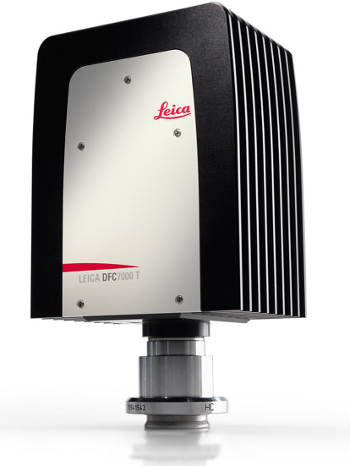Leica Microsystems has launched the digital CCD color camera Leica DFC7000 T, which has been developed for both fluorescence and brightfield applications.
The camera has a highly sensitive quad-tab sensor and is cooled. Users can acquire brightfield images due to the high camera resolution and distinctive color fidelity. At the same time, the camera?s high signal-to-noise ratio and sensitivity allow for detection of fluorescence signals, delivering crisp images.
Users can save time as they do not need to change cameras during their experiments. The Leica DFC7000 T can be integrated into the microscope environment with the imaging software Leica Application Suite (LAS) or Leica Application Suite X (LAS X).
Leica Microsystems Product Manager Dr. Karin Schwab comments:
"The Leica DFC7000 T is a perfect work-horse: It fulfills the tasks of two cameras. Users can obtain fluorescence and brightfield images with only one device, sparing laborious camera changes. In addition, users can perform outstanding multi-color fluorescence imaging."
 The multi-purpose camera Leica DFC7000 T is an ideal tool for the acquisition of brightfield and fluorescence images and performs outstanding simultaneous multi-color fluorescence imaging.
The multi-purpose camera Leica DFC7000 T is an ideal tool for the acquisition of brightfield and fluorescence images and performs outstanding simultaneous multi-color fluorescence imaging.
The Leica DFC7000 T is based on the Sony ICX674AQG CCD sensor with Exview HAD II technology featuring 2.8 megapixels. Its pixel architecture delivers high-resolution images while maintaining a wide dynamic range. Its specialty is simultaneous multi-color fluorescence imaging, even in the near infrared range. If needed, the sensor can be switched to high-speed mode and delivers 40 frames per second (fps) full frame or up to 123 fps in 5 x 5 binning mode. Furthermore the camera can be triggered so that the entire imaging system can be orchestrated and fine-tuned.
The camera's operating temperature (+5° C to +50° C) allows cooling down or heating up the sample without image quality loss, for example in the course of heat shock experiments. For seamless integration into the microscope system via USB 3.0, the camera is supported by LAS and LAS X.
For more information please visit the Leica website.
About Leica Microsystems
Leica Microsystems develops and manufactures microscopes and scientific instruments for the analysis of microstructures and nanostructures. Ever since the company started as a family business in the nineteenth century, its instruments have been widely recognized for their optical precision and innovative technology. It is one of the market leaders in compound and stereo microscopy, digital microscopy, confocal laser scanning microscopy with related imaging systems, electron microscopy sample preparation, and surgical microscopes.
Leica Microsystems has seven major plants and product development sites around the world. The company is represented in over 100 countries, has sales and service organizations in 20 countries, and an international network of distribution partners. Its headquarters are located in Wetzlar, Germany.